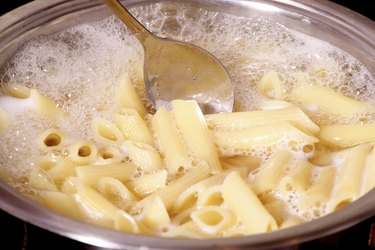
Pasta is an amazingly varied and versatile food. Pasta dishes include spaghetti with a variety of sauces, lasagna and macaroni and cheese. Macaroni salad and other cold pasta recipes abound. Nor are you limited to wheat pasta. Rice pasta is a popular ingredient in many Asian dishes. With all this diversity, it's not surprising that you can pre-soak some types of pasta. Other types don't do well unless you cook them in boiling water.
Soaking Pasta
Video of the Day
Pasta noodles of any kind are essentially uncooked, dried dough. Dry pasta is like a sponge in that it will swell and become soft when you place it in water. Care must be taken when soaking or cooking pasta since individual strands or pieces can clump together. Pasta becomes mushy when overcooked. In general, pasta that can be soaked requires warm or hot water. You should not soak pasta in cold water, although there are a few exceptions. There is no need to soak pasta overnight since it simply does not take that long for the noodles to absorb enough water to become soft.
Video of the Day
Wheat Pasta
Most wheat pastas, such as spaghetti or macaroni, should not be pre-soaked. Instead, heat about six quarts of cold water per pound of pasta until the water is boiling vigorously. Add two tbsp. of salt and the pasta. Boil for 8 to 12 minutes or until the pasta is tender but still firm. At this point you can add some cold water to stop the cooking process. Drain the pasta but don't rinse it unless your recipe specifically says to do so.
Lasagna
Lasagna noodles are large and flat, and can be pre-soaked. Fill a large, flat pan, such as a baking pan, with water. Add two tbsp. of salt. Lay the noodles flat in the water. Allow the noodles to soak until they are soft. You may use either cold or hot water. Just bear in mind that a cold water soak will take longer. Once the pasta has finished soaking, drain and rinse the noodles and add them to the other ingredients of your lasagna recipe.
Rice Pasta
Rice vermicelli and other rice pastas must be pre-soaked. Place the noodles in a pan of hot water and allow it to stand for 5 to 10 minutes, or until soft. If your recipe calls for a cold water soak, leave the noodles in the water for about 20 minutes. Drain the noodles when they are soft. If your recipe calls for stir-frying or deep fat frying, the noodles are ready at this point. Otherwise, place the soaked noodles in boiling water for 2 minutes. Remove the noodles from the stove and drain.